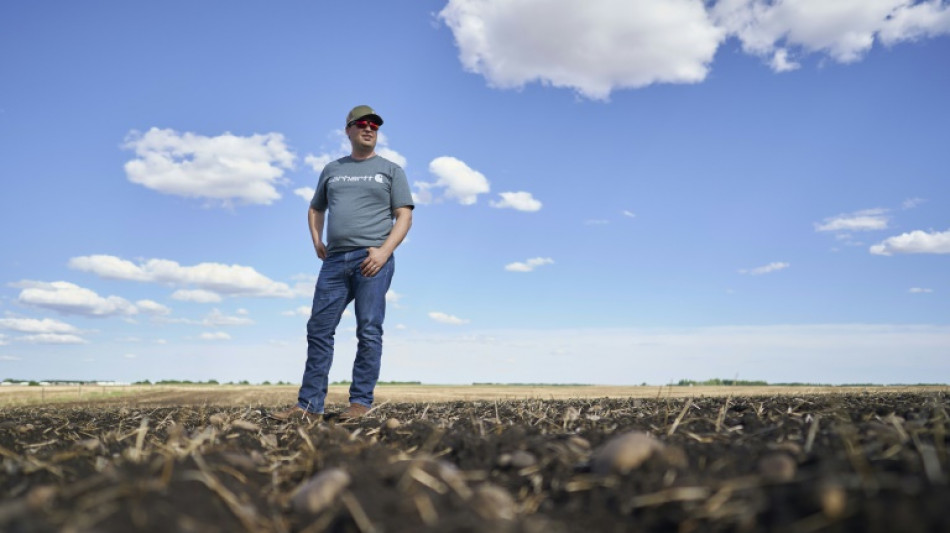
-
 Shiffrin wins Levi slalom for 98th World Cup victory
Shiffrin wins Levi slalom for 98th World Cup victory
-
Israel pummels south Beirut as Lebanon mulls truce plan

-
 Religious Jews comfort hostages' families in Tel Aviv
Religious Jews comfort hostages' families in Tel Aviv
-
German Greens' Robert Habeck to lead bruised party into elections

-
 Johnson bags five as Australia beat Pakistan to seal T20 series
Johnson bags five as Australia beat Pakistan to seal T20 series
-
Zelensky says wants to end war by diplomacy next year

-
 Rugby Union: Wales v Australia - three talking points
Rugby Union: Wales v Australia - three talking points
-
10 newborns killed in India hospital fire

-
 Veteran Le Cam leads Vendee Globe as Sorel is first to quit
Veteran Le Cam leads Vendee Globe as Sorel is first to quit
-
Bagnaia on pole for Barcelona MotoGP, Martin fourth

-
 UN climate chief urges G20 to spur tense COP29 negotiations
UN climate chief urges G20 to spur tense COP29 negotiations
-
Rauf takes four as Pakistan hold Australia to 147-9 in 2nd T20

-
 World not listening to us, laments Kenyan climate scientist at COP29
World not listening to us, laments Kenyan climate scientist at COP29
-
Philippines warns of 'potentially catastrophic' Super Typhoon Man-yi

-
 Wales take on Australia desperate for victory to avoid unwanted record
Wales take on Australia desperate for victory to avoid unwanted record
-
Tyson beaten by Youtuber Paul in heavyweight return

-
 Taylor holds off bloodied Serrano to retain undisputed crown
Taylor holds off bloodied Serrano to retain undisputed crown
-
Japan PM expresses concern to Xi over South China Sea situation

-
 Tens of thousands flee as Super Typhoon Man-yi nears Philippines
Tens of thousands flee as Super Typhoon Man-yi nears Philippines
-
Hoilett gives Canada win in Suriname as Mexico lose to Honduras

-
 Davis, James spark Lakers over Spurs while Cavs stay perfect
Davis, James spark Lakers over Spurs while Cavs stay perfect
-
Mushroom houses for Gaza? Arab designers offer home-grown innovations

-
 Gabon votes on new constitution hailed by junta as 'turning point'
Gabon votes on new constitution hailed by junta as 'turning point'
-
Young Libyans gear up for their first ever election

-
 Vice tightens around remaining civilians in eastern Ukraine
Vice tightens around remaining civilians in eastern Ukraine
-
Dutch coalition survives political turmoil after minister's resignation

-
 Uruguay end winless run with dramatic late win over Colombia
Uruguay end winless run with dramatic late win over Colombia
-
Max potential: 10 years since a teenage Verstappen wowed in Macau

-
 Tens of thousands flee as Typhoon Man-yi nears Philippines
Tens of thousands flee as Typhoon Man-yi nears Philippines
-
Is Argentina's Milei on brink of leaving Paris climate accord?

-
 Big Bang: Trump and Musk could redefine US space strategy
Big Bang: Trump and Musk could redefine US space strategy
-
Revolution over but more protests than ever in Bangladesh

-
 Minister resigns but Dutch coalition remains in place
Minister resigns but Dutch coalition remains in place
-
Ireland won 'ugly', says relieved Farrell

-
 Stirring 'haka' dance disrupts New Zealand's parliament
Stirring 'haka' dance disrupts New Zealand's parliament
-
England's Hull grabs lead over No.1 Korda at LPGA Annika

-
 Kosovo players walk off in Romania after 'Serbia' chants, game abandoned
Kosovo players walk off in Romania after 'Serbia' chants, game abandoned
-
Kosovo players walk off in Romania game after 'Serbia' chants

-
 Lame-duck Biden tries to reassure allies as Trump looms
Lame-duck Biden tries to reassure allies as Trump looms
-
Nervy Irish edge Argentina in Test nailbiter

-
 Ronaldo at double as Portugal reach Nations League quarters, Spain win
Ronaldo at double as Portugal reach Nations League quarters, Spain win
-
Fitch upgrades Argentina debt rating amid economic pain

-
 Trump picks Doug Burgum as energy czar in new administration
Trump picks Doug Burgum as energy czar in new administration
-
Phone documentary details struggles of Afghan women under Taliban

-
 Ronaldo shines as Portugal rout Poland to reach Nations League last-eight
Ronaldo shines as Portugal rout Poland to reach Nations League last-eight
-
Spain beat Denmark to seal Nations League group win

-
 Former AFCON champions Ghana bow out as minnows Comoros qualify
Former AFCON champions Ghana bow out as minnows Comoros qualify
-
Poland, Britain reach BJK Cup quarter-finals

-
 At summit under Trump shadow, Xi and Biden signal turbulence ahead
At summit under Trump shadow, Xi and Biden signal turbulence ahead
-
Lebanon said studying US truce plan for Israel-Hezbollah war


Canadian Prairies farmers try to adapt to a warming world
Following repeated droughts, Canadian farmers are trying to adapt to a new era in agriculture marked by a warming world -- including by trapping snow in their fields, planting heat-resistant crops and seeding earlier in the season.
But it's unclear, they are the first to admit, if their slogging will bear fruit.
Squatting in the middle of a canola field in Alberta, on the western edge of Canada's vast Prairies region, Ian Chitwood surveys the shoots sprouting between long furrows of black soil.
His battle with the heat has been starting earlier every year.
By planting his crops earlier in the season, in May, Chitwood aims to "move up the flowering window," during which the plants are most vulnerable, in order to protect them from the heat in June.
But what his crops really need in the wake of a devastating drought in 2021, he acknowledges, is mild weather and humid soil.
That drought was a "once in 100 years event," says Curtis Rempel of the Canola Council of Canada.
That year, the west of the country sweltered under record high summer temperatures, with the mercury reaching 49.6 degrees Celsius (121.3 Fahrenheit).
"It sure had an impact on yields," reducing them by 50 percent, according to Rempel.
Such hits have had significant impacts on international markets, as Canada exports 90 percent of its canola harvest -- used mostly for cooking oil and biodiesel fuel.
- Water management -
Most canola crops are grown without requiring irrigation in the Prairies, the nation's agricultural heartland spanning nearly 1.8 million square kilometers (695,000 square miles). But the region is sensitive to droughts, whose frequency and severity have been steadily increasing.
In this region, explains Phillip Harder, a hydrology researcher at the University of Saskatchewan, in Saskatoon, "crop production relies on water that accumulates throughout the year." In other words, snow that accumulates over winter and soaks into the ground during the spring thaw.
But howling winds over fields that stretch as far as the eye can see have been blowing away much of that snow of late.
Some farmers have turned to a century-old solution of planting trees in and around their fields to trap the snow.
"In the wintertime when the snow blows it catches in the trees, and then it slowly soaks into the ground," explains Stuart Dougan, a 69-year-old farmer with a weather-beaten face.
In the spring and summer, the trees provide further shelter from the wind "so it's not taking the moisture from the crops," he adds.
Trees may pose new challenges, however, as modern agricultural equipment is much bulkier than in the 1930s when one could more easily plow around a tree trunk, points out Harder.
Alternatively, he recommends when harvesting crops to cut the plants higher on the stem, leaving longer "stubble" sticking out of the ground to "increase snow retention."
- Turning to science -
"We've always looked to keep as much stubble in place to catch the snow and reduce evaporation rates," says Saskatchewan farmer Rob Stone. He, like many Canadian farmers, stopped plowing his fields in the 1990s for this very purpose.
He's now experimenting with new genetically modified seeds that he says hold hope for the future of canola. Four small flags in the middle of his fields mark a test crop.
"As we find ones that are more tolerant (to heat), we will crossbreed them to make a new (plant) population," explains Greg Gingera, a genetics researcher.
Also in the works, adds Rempel, are several companies looking to develop "biologicals or bacteria or fungi that you add to the soil or spray on top of the plant to confer stress tolerance."
But it will be seven to eight years before a product is likely ready to be commercialized and widely available, he says.
In the meantime, farmers will have to make do.
C.Meier--BTB
